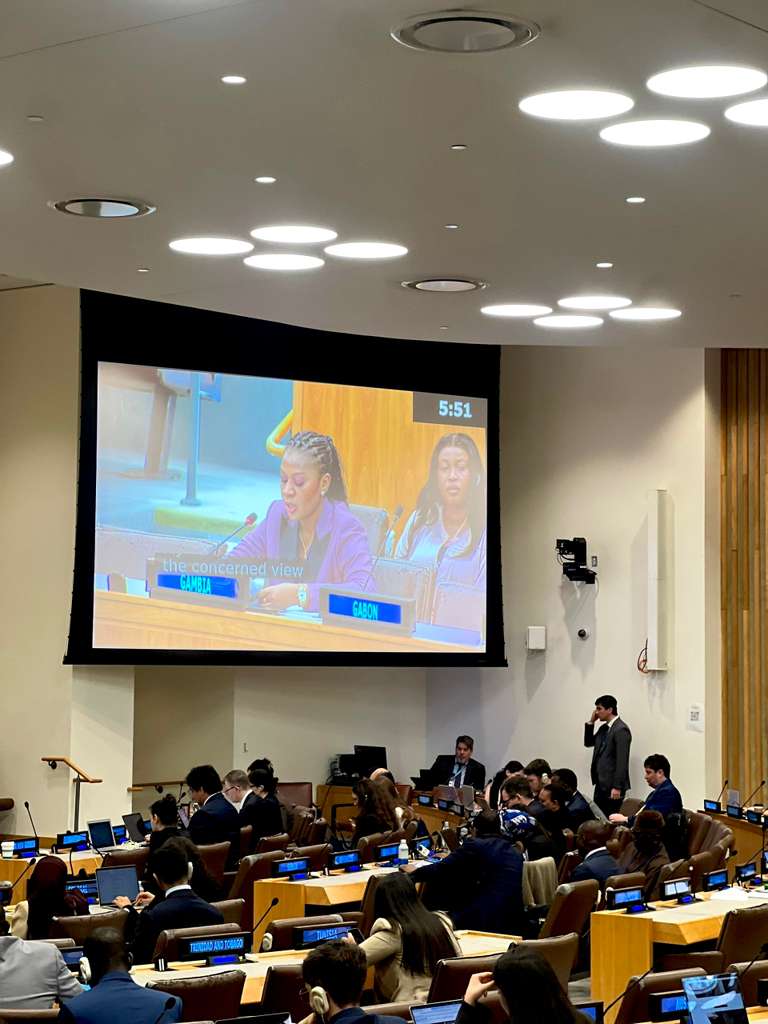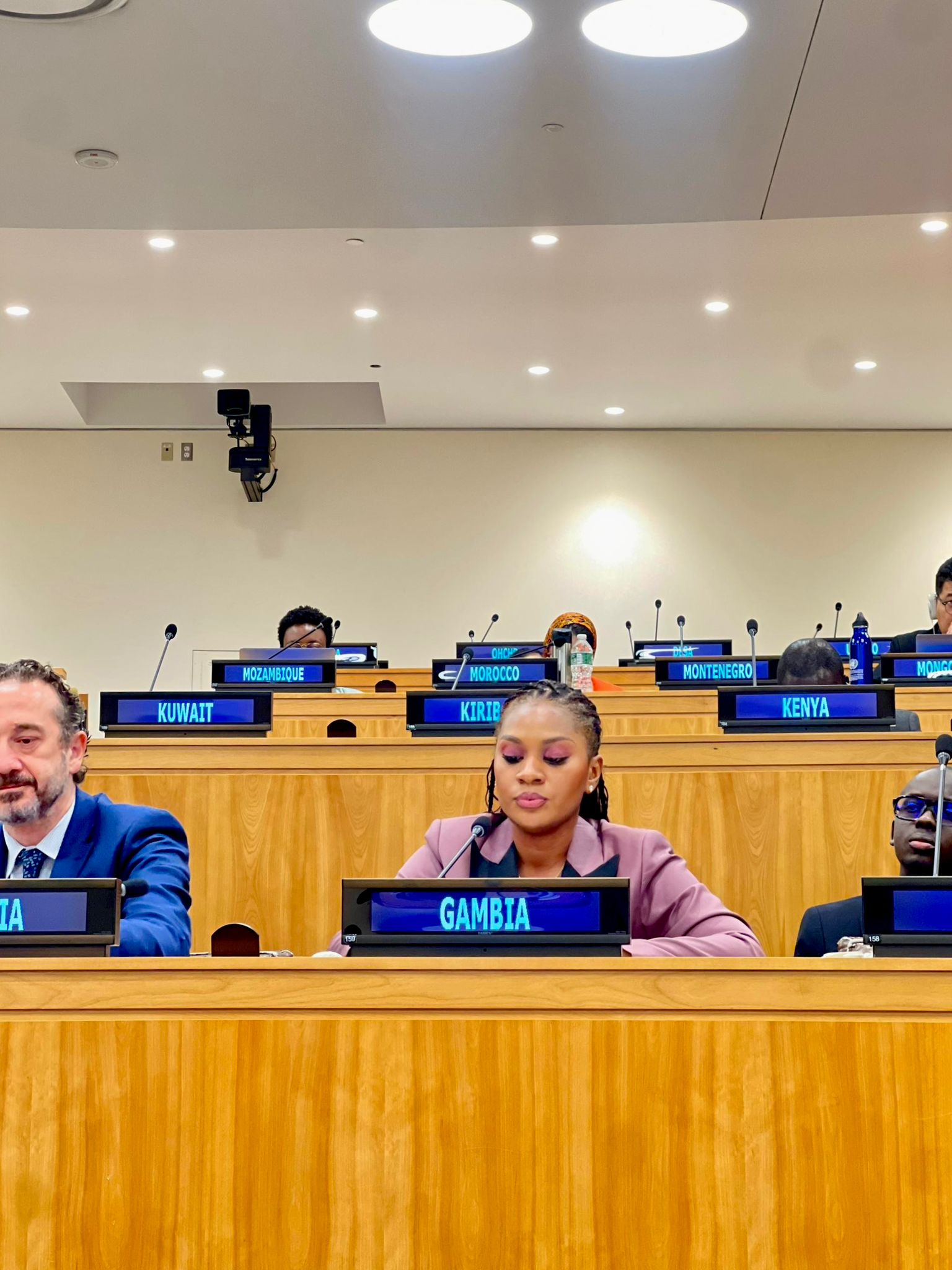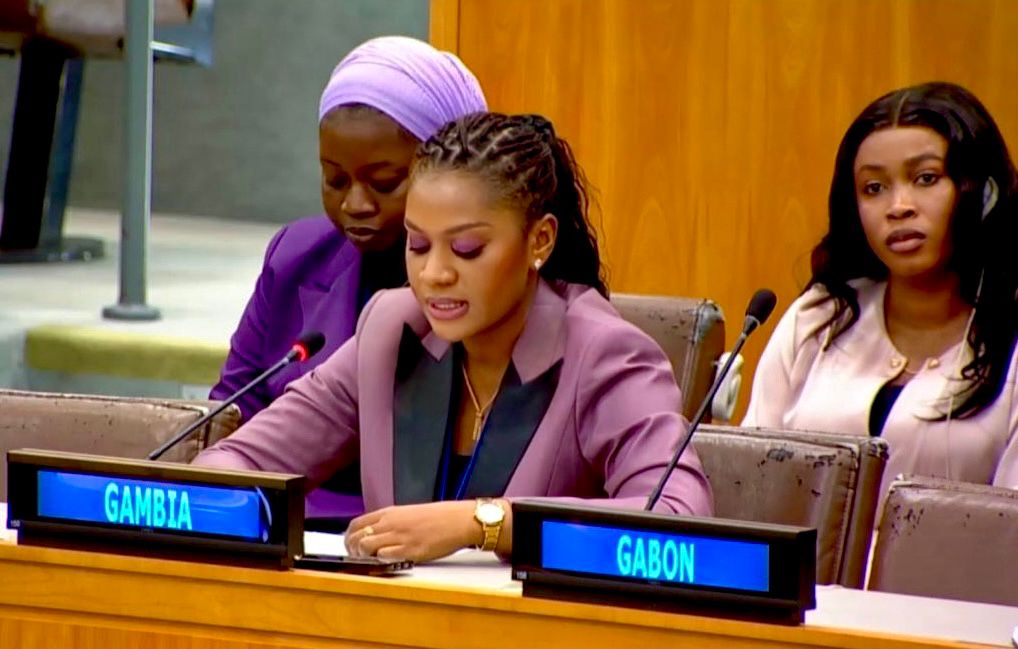Mr. Chair,
Since this is the first time I am taking the floor, I wish to congratulate you and members of the Bureau on your well- deserved election and to thank you for your leadership in steering the affairs of the Committee. At the outset, The Gambia aligns with the Statement delivered by the distinguished representative of Iraq on behalf of the G77 and China and the Statement delivered by Guinea Bissau on behalf of the Africa Group and wish to make the following statement in its national capacity:
This year’s session came at a time of profound importance as we mark the 80th Anniversary of the UN Charter. The abiding legacy of the Charter demonstrates the importance of collaboration to tackle the problems of today. I reiterate The Gambia’s commitment to upholding the values upon which the United Nations was founded: maintenance of peace, human rights and collective action, so that we can address in unison the most pressing challenges of our time, for example, lifting millions out of poverty and disease, promoting democracy, protecting children, and building bridges between communities worldwide.
We commend the efforts and the dynamism that has delivered real progress but focused on the future that we can advance together and our firm assurance that The Gambia will be central to all major issues affecting the globe.
In addressing the issues of immense international importance on the topics placed before this committee for consideration, The Gambia notes the following:
- The need to address the root causes of poverty is of significant importance. As we work on identifying ways to weave social cohesion ,The Gambia calls for enhanced role in proactively addressing the underlying causes and drivers of poverty and reiterate the committement espoused in the ideals of the Copenhagan Declaration . The Gambia further believes that only through committed, inclusive national and international ownership that considers the needs of the most marginalized, including women, young people and people with disabilities can poverty eradication strategies work to dismantle intrinsic barriers. Inclusive governance and accountability are central to addressing the economic factors driving the cause of poverty. Essentially, The Gambia calls for the need to help build resilience of communities by restoring social cohesion, facilitating civic participation, distributing resources and safeguarding minority rights to fight the multidimensional nature of poverty and as we look forward to the World Social Summit in Doha, The Gambia encourages Member States to use this collaborative platform to showcase efforts, share challenges and mobilise commitment to double efforts to confront the ills of poverty and marginalization. 2030 is around the corner, it is time to look at progress and forge a common path ahead, so that we can collectively address all the challenges that are still abound.
- On the issue of migration, The Gambia calls for the full realization and enforcement of the rights and dignity of migrants in countries of origin, transit, destination and international borders. The Gambia reiterates that the complex phenomenon of migration underscores the need for urgent international cooperation to address the realities in in a way that emphasis the needs to protect migrants at the center of global governance.
- On the issue of of human trafficking,The Gambia notes that although the menace of Human Trafficking or Modern-day slavery has garnered political priority, it is however undisputed that it has become an existential crisis of a large, global, and humanitarian problem that requires joint and concerted efforts from the international community. While significant policies have been established at the international and regional level, it remains uncertain what tangible progress has been made if any to curb the illicit activity, particularly on the aspect of child trafficking. In this regard, The Gambia calls for the effective and comprehensive implementation of the United Nations Convention on Transnational Organized Crimes.
- My delegation is also of the considered view that the need to combat human trafficking requires reaffirming solid commitments towards addressing social, economic inequalities and underdevelopment which are mutually reinforcing. The Gambia also welcomes the initiative for the 2025 Political Declaration on the Implementation of the United Nations Global Plan of Action to Combat Trafficking in Persons.
Chair on Women,
- The Gambia fully supports the commitment on the advancement of women. The Gambia believes that despite the fact that significant strides in mainstreaming women empowerment, gaps still remain in placing women of different social backgrounds and competencies at the centre of development discourse and programmes. In many societies, the lack of progress from certain norms has forced women on the periphery of national development. Therefore, greater reflection should be devoted to addressing this unjust state. We need greater investment, more innovation, and strong political will to close the real gaps that remain in women’s empowerment and leadership, in legislation, in services, and in systems that ensure justice, and accountability, and an end to impunity. This requires a whole of international commitment and working through inclusive and practical ways with all communities and stakeholders for social change.
- As we commemorate the 25th anniversary of the adoption of the UN Security Council Resolution 1325 on Women, Peace, and Security. The Gambia remains seriously concerned about the marginalization of women and neglect including the low or lack of women’s participation in formal mediation processes and at the peace table raises severe concerns. This is a key area that needs to be prioritized in addressing our peace and security challenges. Against this backdrop, The Gambia recommends the active and meaningful engagement of women in conflict prevention and mediation efforts . We equally endorse the need to build and provide a platform for strategic advocacy, capacity building and greater networking aimed at enhancing the implementation of the commitments for women’s inclusion in peace-making, decision making and post conflict reconstruction and transitional justice processes .Resolution 1325 continues to be a source of inspiration and optimism in the forward march towards enriching the discourse on the advancement of women’s empowerment agenda.
- The protection of the rights of the child remains significant concern, particularly for children affected by armed conflict. We continue to share the perspective that inadequate protection of children has serious humanitarian ramifications, as well as immediate and long-term impacts on our sustainable development, peace and security endeavours. The conflict happening around the globe showcase the need to adopt and deploy concrete measures that yield progressive steps to end and prevent grave violations affecting children during armed conflict.
- The Gambia calls for increased capacity-building for technical support and advice on the children in armed conflict agenda to relevant national, regional, subregional and international partners, including Governments, the United Nations and civil society, and invites Member States to support this process. The continued prevalence of conflicts in their various forms adversely undermines children’s fundamental rights and welfare and so requires a reflecting moment to explore all possible avenues to address this menace.
- On countering the use of information and communication technologies for criminal purposes, The Gambia believes that as AI systems grow more powerful, the time to develop thoughtful rules and governance to steer this technology for broader global benefit is essential. Our delegations emphasize the need for international cooperation to establish guidelines and tools for AI, ensuring it serves humanity and promotes stability rather than deepening divides. We believe it is necessarily prudent that much of the attention, both in government and the private sector, is focused on the extreme risks and global security threats.
- In many African countries, comprehensive policy frameworks to incentivize responsible AI, regulate AI-driven business models, and promote the creation and capture of high-quality data are lacking. The Gambia also calls for a proactive and significative African participation in international discussions and negotiations on AI and data governance to promote our perspectives as a region, preserve our common interests and ensure our nations and people equitably access to AI based resources and opportunities. This is the ultimate solution to make Artificial Intelligence and technology a beneficial force and constructive power for humanity.
- On the protection of fundamental human rights, The Gambia continues to commit to the enduring principle adopted by the United Nations to prevent atrocity crimes such as genocide, war crimes, ethnic cleansing, and crimes against humanity. The Gambia believes that our resolve must remain steadfast: to protect vulnerable populations, uphold human rights, and advance global peace.
- Domestically,The Government has taken conscious and informed policy decisions to set up institutions and reform processes aimed at promoting and protecting human rights as well as address past violations. These includes setting up the TRRC, CRC, NHRC, SSR, Review of the Criminal Justice System, and ratification of more human rights instruments.
- In this spirit, The Gambia reaffirms the universality, indivisibility, interdependence and interrelatedness of all human rights and fundamental freedoms and the need for persons with disabilities to be guaranteed their full enjoyment without discrimination.
- We must increase our vigilance by adopting all measures and wide-ranging actions to defend human rights and advance the rule of law. As we strive to protect people from atrocity crimes and potential genocide, there is a stronger need today than ever before to remain true to the principles and ideals espoused in the Declaration unanimously endorsed 20 years ago on Responsibility to Protect during the World Social Summit.
- By commemorating the 20th Anniversary of this important principle, The Gambia urges all Member States to use this opportunity to re-commit ourselves to preserving the memories of those who lived through the horrors of the genocide and atrocity crimes.
- To this end, Global solidarity and solutions are needed more than ever. We need more robust multilateralism and a renewed commitment to the purposes and principles of the UN Charter.
Chair on racism, xenophobia and religious intolerance,
- In the Call to Action, and in bringing a sense urgency to this modern-day plague, The Gambia is of the strong view that the international community should resolutely tackle the repeated incidents of desecration of holy books, rise of xenophobia, racial profiling, stigmatization, discriminations based on religion or belief, hate speech and incitement to violence. As in too many places today, communities, faith-based organizations are facing growing hostility, in the form of discrimination, dehumanization, harassment, desecration of places of worship, and physical attacks. So, our common purpose is to defend the human right of all people to practice their religion or faith, without fear and to ecumenically advance dialogue between civilizations as a pillar for peace and stability.
As I conclude Mr . Chair, please allow me to express The Gambia’s unwavering commitments to global efforts towards human rights, rule of law and sustainable development.
I thank you for your kind attention!



